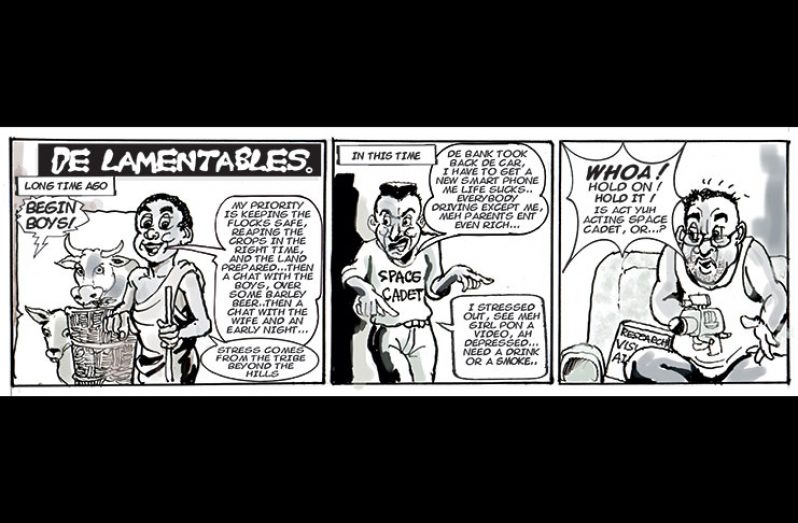I READ an article in the August 28, 1995 edition of TIME magazine by Robert Wright titled, ‘20th Century Blues’. That article revolved around the then new study of evolutionary psychology on the intense stress, anxiety and depressions that are evident products of our present age of ‘Things to own’.I was at first sceptical of what it was implying, but a closer examination exposed the fact that somewhere along the historical road of human development, from tribes to kingdoms, City States to empires, we screwed ourselves.
Whether Bantu, Teutonic, San, Celtic, or Arawak, there was a consistent stress relief component. Every tribal member was housed and had land to farm, and guilds of blacksmiths, boat builders and sculptures were accommodated and their needs attended.
Crimes of today, like kidnapping women from other tribes and raiding merchant caravans, were sanctioned by the tribal hierarchy. One could be enslaved through debt, and emancipated on completing debt quotas. Those who stole from the tribe, or violated sacred decrees, however, could be put to death or banished. The latter was the worse, because, to be ostracised in the ancient world without any support system was worse than any other punishment.
JUST A MYTH
Under no illusion must we indulge in the myth that there were no ‘Tribal wars’. Yes! They fought! Took other people’s grazing grounds, like the Bantu and San of Southern Africa!
Others like the Vikings were not farmers, but had a religion that justified theft and pillage, while the nomadic Aryans, upon arriving in India, conquered and created the first Apartheid system, decorated with Gods.
Our world today differs in the context that everything appears to be possible, though nothing is assured. The tribal and the caste system of two millennia past still reside in the reservoir of our consciousness, though other more functional idols have replaced the old gods in the active consciousness. The ego is sated with the adornments, through ownership of things.
Of course, being comfortable is important, but the pale side of the ego seems to demand that one must acquire and exert authority, based on ownership of real estate, adequate money to spend, and a shiny modern day coach.
The gods of old were praised when the harvest was bountiful; we adhered to rituals on behalf of family and tribe. But that is now gone! We have evolved! For, indeed, many of the imposed ties to family and tribe have become counter-productive.
A NEW PARADIGM
We are individuals now, with immediate ties of wife and children, and the new awareness that, in the modern sense, those you call your brother and family may not even share blood with you, but in works have earned that kinship.
The process of disappointment, confusion, betrayal and self preservation that followed the collapse of the tribal empire, City States and the emergence of the justification of slavery through religion destroyed the tribal values, ushering the new ‘Idol Gods’ of ethnicity that were façades for economic control towards the dawn of our technological world. It is this, our modern world’s tools and toys, that are the triggers of anxiety, depression and extreme stress.
Imagine a Guyana without a computer that is Online; a printer without its store of paper and printing inks; a smart-ish phone to receive emails when mom is on Facebook; and a workable informative family library.
The picture for a stressful family is clear; not to mention comfortable own-housing, meeting the bills, and the threatening creatures in the street and in the substance yards around where you live. All amount, I’m convinced, to the constant pounding of stress, anxiety and spasms of depression in the face of seeming helplessness and despair of not being able to reach the picturesque ideals brandished before us on TV and in magazines.
The TIME article at reference, subtitled ‘The Evolution of Despair’, was researched in the metropolis of the First World. But its features were taking hold right here in Guyana even at that time.
I was sceptical about the article until I read the supporting science: “The Anthropologist, Philip Walker has studied the bones of more than 5,000 children from hundreds of pre-industrial cultures dating back to 4,000 B.C.
“He is yet to find the scattered bone bruises that are the skeletal hallmark of ‘Battered-child syndrome’.
“In some modern societies, Walker estimates that such bruises would be found on more than one in twenty children who die between the ages of one and four.”
WIND OF CHANGE
Guyana is at the brink of becoming a financially better-off society with the finding of oil. How do we re-establish and repair the human disconnect that has affected our culture over the past 20 years; a time when criminal lawlessness was met with accommodating indifference, and even collaboration, by the very authorities that were supposed to shepherd the nation; a time when, in our villages, a senior cannot trust a young person without the risk of being robbed or murdered?
Undoubtedly, we have to explore inherited or cultivated anxieties and depression in our culture. The transformation of the Merriman Mall in Georgetown, and the open spaces dedicated to the public by businessmen in Berbice is a beginning of creating the environment for family socialisation.
In the building of new housing schemes, roads should be paved to properly accommodate pedestrians, and to echo the President’s statement for the need for ‘open spaces’ in living environs; parks that can be embraced by the musician, the dancer or the poet, therby taking the mind away from the maladies of our age into the healing refuge of a saner place.
The times we live in –How it’s affecting us
SHARE THIS ARTICLE :
Facebook
Twitter
WhatsApp




.jpg)










